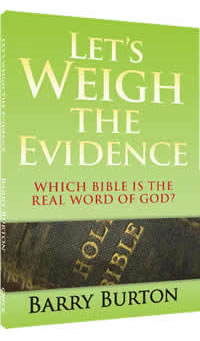Would You Let Dishonest Scholars Determine Your Faith?
One of the best kept secrets today is that unbelievers with ulterior motives were involved in the "translation" of the modern Bibles. But they have been trusted to change the Bible just because they were called "scholars."
Being a "scholar" doesn't guarantee that you are a good person with good intentions. History tells us that the 50+ scholars that translated the King James version were honest men.
Not so of the men who prepared the Wescott and Hort Greek that is the basis of the modern bibles. In their dishonesty they tossed out piles of documents that support the manuscripts used to translate the King James. Instead, they chose just a handful of questionable Greek manuscripts with different wordings.
And other dishonest men deceptively provided those counterfeit manuscripts to the "scholars," Westcott and Hort, who used them to prepare their Greek New Testament. The result was a Greek manuscript riddled with doubtful passages.
Some verses were omitted, and others were changed. Some have footnotes that raise doubts about a passage, leaving the reader to decide for himself whether he believes that that scripture is really God's words.
How did this come about? For over 200 years the King James Bible was honored by the Western World as God's preserved words in English. Then some unbelievers began to suggest it was obsolete and needed "updating."
Honest men pointed out the risk that the process might be sabotaged by bad men and that readers only needed to learn the classic English to understand the pure words in the King James. They were quickly shouted down.
At that time in history the dishonest Bible scholars were in love with science. They used a faulty science to justify scrapping the King James manuscripts and approve the counterfeits. Their lies were bought by the translators who used the Westcott and Hort Greek to produce the first modern New Testament.
Publishers appeared on the scene about that time using high speed printing equipment to flood the world with printed material. The new bibles fit right into that market. They copyrighted the new bibles and the Bible believers flocked to the bookstores.
To copyright something, it must be a "new work," substantially different from another work. Yet we are told by the publishers that "all bibles are basically the same." But a side-by-side comparison exposes that as an urban legend.
Bible publishing has become such a gold mine that most bibles are now published by secular publishers. Continually appealing to the public's desire for "some new thing" guarantees a steady cash flow.
Anyone for a "Cotton Patch" Bible?
So, what to do? If you are a sincere Christian, you must choose a Bible that becomes your standard reference for truth. In view of the facts above, the choice is obvious.
However, if you are in a leadership position where a sudden shift would confuse the sheep, you must be a gentle shepherd. The first step is to begin your own study with the King James as your standard. You can begin then to use it as your references, when you speak, as frequently as your people are willing to follow you.
At the same time you can begin to educate key influencers in your congregation with the facts of this betrayal by the scholars. You must be prepared to ably articulate this shocking history to those above you and below you.
David W. Daniels has researched Satan's attack on God's words. His many books on the subject will give you the frame of reference necessary to make this vital shift. One of his books describes how over 200 important verses or phrases are missing in the modern bibles.
In John 14:15, Jesus says "If ye love me, keep my commandments." How can we do that unless we know exactly what they are? No doubt, most will "go with the flow." But no Bible that contains partial truth can make us truly free. And only the complete truth will set sinners free.
- See more articles on related topics:
- Bible Versions
- Westcott and Hort
- Modern Versions
Other Articles from March/April 2024:
More on Bible Versions:
Products of Interest:
-

Look What's Missing!
256 pages
For years, publishers have been removing words, and even whole verses, from modern Bibles. What's missing from your Bible? Take a look! -

Let's Weigh the Evidence
96 pages
In simple language, this book provides the basics of the Bible version issue, showing why the King James is the only Bible you can trust. Compare the solid history of the King James Bible with the new Bibles that remove Christ’s Virgin Birth and His Second Coming. Learn about Westcott and Hort’s bait-and-switch, missing verses and words, the Living Bible’s tampering, copyright issues, and more! -

But I Trust The Scholars
80 pages
There are two kinds of Bible scholars: the scholars of faith and the scholars of doubt. Which one will YOU trust? -

Understandable History of the Bible
557 pages
You'll learn the history of the Bible in this well-documented but easy-to-understand book. -

Sabotage?
32-PAGE, FULL COLOR COMIC BOOK - See the struggle through the ages to keep God’s Word pure, and learn which Bible can be trusted... and why!



